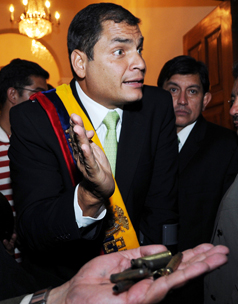The streets of Ecuador remained quiet today, a day after a dramatic standoff left President Rafael Correa holed up in a hospital for 12 hours and claiming that a coup attempt was underway.
A state of siege is still in effect, meaning the military is temporarily in charge of Ecuador.
Although President Correa was rescued late Thursday night by the military, after protesters had trapped him in the hospital where he sought refuge, many are wondering about the ramifications of the revolt and how to heal some of the divisions that have been growing in the country.
“We had a very tough situation yesterday, and I am very happy that it has ended with the president alive,” Ecuadorean Ambassador to the United States, Luis Gallegos, said in a phone interview. “Now is a moment for reflection to look into what happened.”
Calls for Normalcy
Unrest began when disgruntled police, angered over a new law that limits bonuses, sprayed Correa with tear gas and roughed him up as he sought to resolve a protest that erupted Thursday. Officers across the country soon seized control of police barracks, blocked highways, and shut down the international airport in Quito.
Correa says officers are now facing scrutiny, sanctions, and even purging. Gen. Freddy Martinez, the chief of the national police, resigned Friday, according to the Associated Press.
Most residents have faith that the worst is over. “I think that for the moment the situation has calmed down. It was a shock for all to see that you could take down a democratically elected government, but for now even the opposition is calling for normalcy,” says Paola Vallejo, a consultant in Quito.
Clinton: ‘Full support for President Correa’
But the crisis is not over. Correa has said that yesterday’s revolt was not a matter of simple salary issues and that he is the victim of a larger political effort to undermine him. Some Latin American leaders, including Hugo Chávez in Venezuela, reiterated that sentiment.
Leaders from the Americas, including those in the United States, have rallied around Correa and voiced support for Ecuadorian democracy. US Secretary of State Hillary Clinton said in a statement Thursday: “The United States deplores violence and lawlessness, and we express our full support for President Rafael Correa, and the institutions of democratic government in that country.”
The group UNASUR, a South American body, sent foreign ministers to Quito on Friday and released a statement to “energetically condemn the attempted coup and subsequent kidnapping of President Rafael Correa Delgado.”
‘Not a Coup Attempt’
Some observers in Quito say the claim of a coup is overstated and being utilized for political gain. “There was not a coup attempt,” says Augusto Tandazo, a political analyst in Quito. “The police were not asking for anything more than not putting the law into effect.”
Tensions could flare anew, too. The turmoil has divided institutions in Ecuador. “What is lamentable about this is the deep gap that will now remain between the police and the military, who shot against one another,” Mr. Tandazo says. “These things take time to heal.”
While some members of the Air Force had participated in the closure of the airport, the armed forces chief, Gen. Ernesto Gonzalez, put the military’s support behind the president.
But he said the law that generated the revolt – which takes away bonuses and medals associated with promotions and also increases the years that police and military members must work before receiving promotions – should be modified or nixed.
Test of Correa’s Flexibility
Correa, who was elected in 2006, is known for his fiery rhetoric. Yesterday he claimed that the law was not read or understood by the police and will not reduce their overall compensation. “When they demanded that I revoke the law to let me out, I told them, ‘Don’t waste time with me. I leave as president of a dignified nation, or I leave as a cadaver,’ ” Correa said Thursday night. “Of course, the law will not be revoked.”
The ultimate decision about whether the law is published, which puts it into effect, or revised could dictate the way the issue is resolved. If it is not changed, says Tandazo, another conflict could flare in the near future, he says. “The style of [Correa’s] inflexibility can bring things to a breaking point,” he says.
Santiago Peralta, who produces cacao in Quito, agrees. “I fear that these protests could repeat themselves. Not now, but in a matter of time,” he says. “Many people hate the way that Correa governs. He acts like a dictator, dominating the national assembly … prohibiting journalistic information that he does not like.”
But Ambassador Gallegos says the event has solidified the resolve for Ecuadorian democracy, and many Ecuadorians agree. The country had seen eight presidents in the decade preceding Correa’s election in 2006, including three ousted by protest.
“I believe that democracy can come out reinforced by this coup attempt,” says Ms. Vallejo, the consultant. “We have witnessed how rebellion and violence are incapable of taking down a president.”
Media that fights fascism
Truthout is funded almost entirely by readers — that’s why we can speak truth to power and cut against the mainstream narrative. But independent journalists at Truthout face mounting political repression under Trump.
We rely on your support to survive McCarthyist censorship. Please make a tax-deductible one-time or monthly donation.
